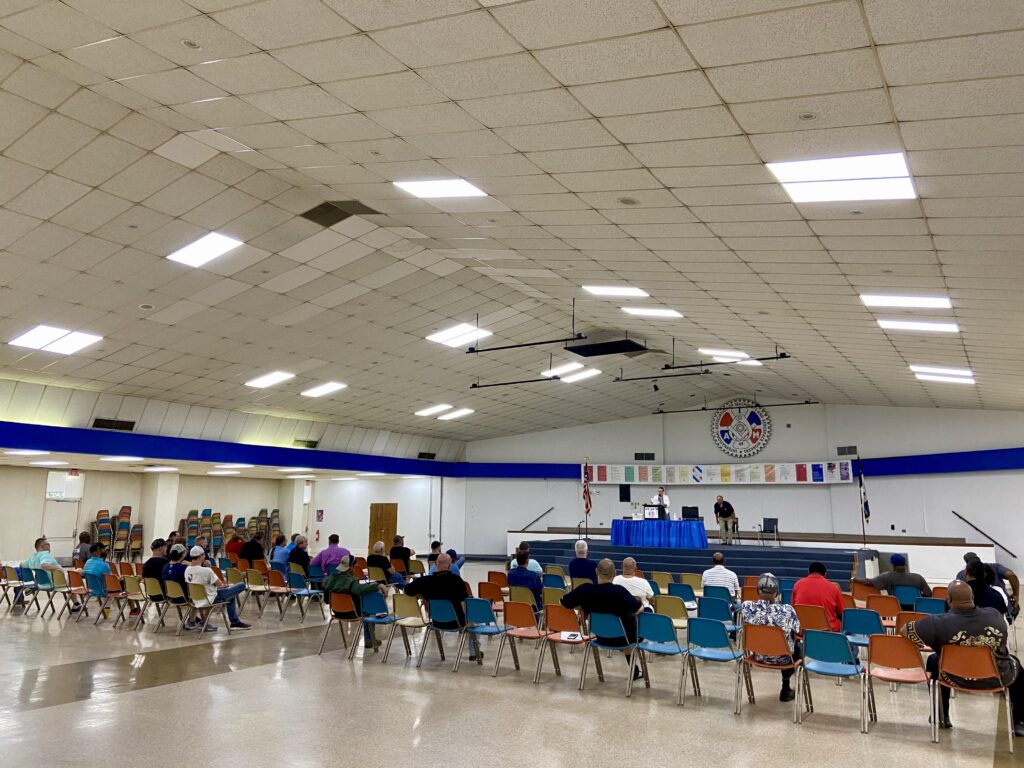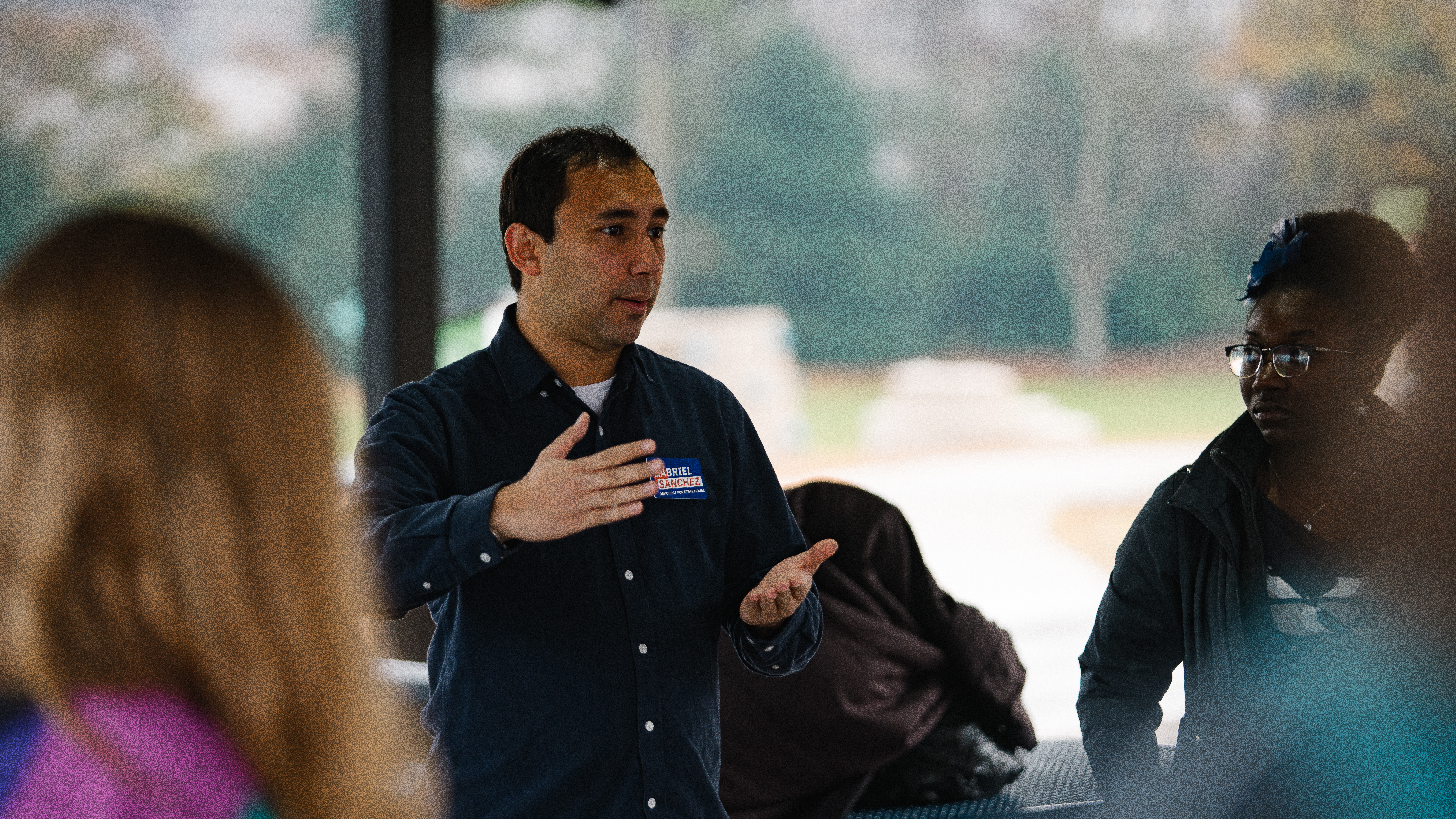When strategists for the Democratic Socialists of America (DSA), a leftist organization whose political platform includes cutting the Pentagon budget to fund climate needs, scouted around for local races in Georgia where they thought a candidate they backed may have a chance at winning, they settled on a curious one. It was House District 42, a swath of suburbs north of Atlanta that includes portions of Marietta, Smyrna, unincorporated Cobb County, and an 850-acre aircraft plant for America’s largest defense contractor, Lockheed Martin.
In May, the candidate the DSA backed, a 27-year-old waiter named Gabriel Sanchez, won the Democratic primary in a local landslide. He ousted a four-term incumbent who took campaign funds from the Arlington-based Lockheed Martin Employees’ Political Action Committee, voted in favor of a 2021 bill that earmarked $100 million in tax breaks to the defense contractor, and lobbied the federal government to grant a lucrative contract to the company. Sanchez beat that incumbent, Teri Anulewicz, 57% to 43%. He’ll face a Republican opponent in November, but his May win in the deeply blue district all but guarantees he’ll end up in the Legislature.
Sanchez spoke with Inkstick about campaigning as a progressive in company town territory and what voters told him and his volunteers — who knocked on 17,000 doors and chatted with thousands of voters — that they cared about.
“Surprisingly, it [Lockheed] didn’t really come up for people in conversations,” Sanchez said. He met employees who worked at the plant and said he didn’t get “any pushback about my candidacy” on the issue. Sanchez said the number-one concern he heard in his district was housing costs in suburbs where homeownership was once affordable but is now increasingly out of reach for working families.
Locals did speak often about Israel’s war on Gaza, telling him they were abstaining from voting because they were “disgusted” with the current administration’s actions, he said. Even though he was running as a Democrat, Sanchez said he and his volunteers “managed to convince some of them to vote for our campaign because we [the DSA] do support a ceasefire.”
$100 Million Tax Break “Megadeal”
While the defense budget is a federal matter, state and local officials also have a say in the contractors’ bottom line and in influencing labor policies.
Chief among the ways that Anulewicz, the incumbent Sanchez beat out, did so was by voting in favor of 2021 legislation championed by Bert Reeves, a Republican state legislator representing Marietta, that earmarked $100 million in state tax breaks for the company. Senate Bill 6 did not name Lockheed Martin, but instead wrote of the special tax breaks for “a high-impact aerospace defense project” that is “constructed by a business enterprise that is a prime aerospace defense contractor with greater than 40% of its revenues derived from sales to the United States government.” The language pointed directly to Lockheed Martin, Georgia’s largest defense contractor, and its Marietta operations, which is Lockheed’s second-largest aircraft plant. Good Jobs First, a national watchdog that scrutinizes state and local corporate tax breaks, classified the Lockheed earmark as a “megadeal” in its Subsidy Tracker.

Georgia’s Republican governor touted the bill as potentially creating 3,000 new jobs manufacturing new types of aircraft at Lockheed. But a closer look at the bill’s text raises questions about those claims: The bill lays out staggered employment benchmarks of 1,000 and 1,800 but makes no mention of those positions being new or the company needing to maintain a baseline number of jobs on ongoing aircraft programs such as the C-130 or the F-35.
The Marietta Daily Journal recently reported that the company already employs 5,600 people at the plant. The Georgia Department of Revenue (DOR) did not answer questions from Inkstick about whether Lockheed could lower its headcount in Marietta and nonetheless receive the tax credits spelled out in SB6. DOR spokesman Austin Gibbons wrote in an email that “a taxpayer’s eligibility to claim a credit is confidential taxpayer information that we cannot disclose.” An attorney for the DOR also told Inkstick it would not provide Lockheed’s performance reports — which track whether the company has met employment and investment benchmarks to claim tax breaks — because those are also considered confidential.
SB6 also allows for counting “leased employees” toward the company’s job figures. The beleaguered local Machinists union, which represents about 2,000 workers at the plant, says that subcontracting positions like grounds keeping, janitorial, and warehousing have been a key way the company stealthily busts its union, as Inkstick reported last year. The legislation also only requires that Lockheed pay its employees “at or above the average wage of the county with the lowest average wage in the state,” which, according to data from the state’s labor department, would be about $19 an hour.
















